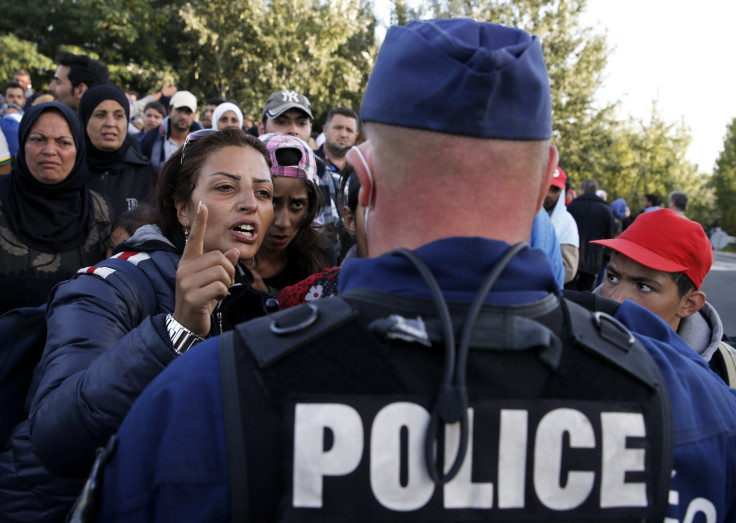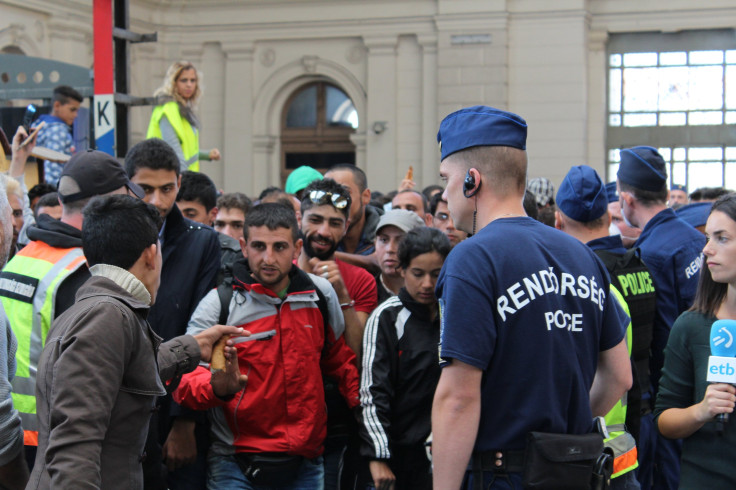Syrians Take Forest Paths From Serbia Into Hungary To Avoid Police Detection

BUDAPEST, Hungary – On the night of Aug. 1, Amer Ali, 29, left the small village of Horgos, Serbia, and headed north into the forest with a group of other Syrian men. They used only the lights on their cell phones and the sound of the river to find their way through the dense pack of trees on the 11-hour hike to Sagida, Hungary. The group had chosen the danger and hardship of an all-night hike in the hope of a new life, free of war.
Ali’s story is similar to that of thousands of Syrian refugees making the long trek from Turkey through the Balkans to Western Europe. For those passing through Serbia to reach countries like Germany, the Netherlands and Sweden, the biggest obstacle is getting into Hungary without being caught by the police, an obstacle Syrians have faced since the civil war began in 2011. For years, Syrians have paid thousands of dollars to smugglers to help them cross into Europe -- the borders were simply never open. When European countries announced earlier this summer that they would open their borders to refugees, it seemed as though there might not be a need for the region's ever-growing smuggling networks. But those networks are now, more than ever, thriving.
Hungarian authorities who catch refugees are legally required to collect fingerprints from the refugees and file them in a European database. Those refugees are then officially processed for asylum status in Hungary. And if the refugees are processed in Hungary, it means other countries could turn them back. In short, refugees from Syria do not want to live in Hungary.

“The problem is the stamping in Hungary,” Ali Hamza, a 28-year-old Syrian, told International Business Times. “I am not going to get stamped, even if they cut my fingers off.”
Early Friday morning, Hamza was walking from Serbia to Hungary. He had yet to cross the Serbian border but planned to travel through the forest like Ali. He was traveling with 26 people from Syria, all of whom were planning to resettle in countries such as Germany, Norway, the Czech Republic and Austria.
"Most of us traveling have experience with the police," Hamza said. "So we know what to expect. We heard that the Hungarian police are beating Syrians to get them to 'finger stamp.'"
Like Hamza, Ali knows the risks. So Ali hired a smuggler in two separate places in Hungary. First, he hired a smuggler to cross Serbia's border en route to Budapest. Once in Budapest, he hired another to get him out of the country to Germany.
"There are so many smugglers just standing at Keleti train station," Ali said. "It is so easy. They just come up to you and ask if you need one. Ours took us by car to Munich."
The price of a smuggler varies significantly depending on the size of the group and whether there are any women or children traveling or people who need more protection. Prices per trip on foot can range anywhere from up to a few hundred dollars to $2,000. By car, the cost is even more.

Beyond the need for refugees to avoid contact with Hungarian authorities, there is the perceived danger of Hungarian civilians.
"They are really racist in Hungary," Hamza said. "I was surprised to see the video of that Hungarian camerawoman tripping the refugees. It made me so sad."
Hamza was referring to a video that went viral this week showing a Hungarian camerawoman tripping refugees -- one of whom was carrying a child -- as they ran from police while carrying a toddler. Hamza said he knows not everyone in Hungary is like that. He said he knows there are families helping Syrian refugees with food and clothing, but the government's rhetoric on the refugee crisis is something he cannot ignore.
Beyond the government's attitude toward Syrians, Hamza and Ali said the economic situation in Hungary would never allow them to find jobs. The Hungarian economy, which has been struggling for more than three years, is teetering. The value of the country's currency, the forint, is on the decline, and the unemployment rate is close to 8 percent.
Besides the dangers from authorities and civilians, there is also the weather. At night, the temperature drops to 48 degrees, and the rain makes the air seem even colder. As the weather turns from summer to fall, authorities in Hungary with the United Nations' refugee agency said refugees will flood the borders this week. They expect up to 40,000 more to reach Budapest by next week.
© Copyright IBTimes 2025. All rights reserved.





















